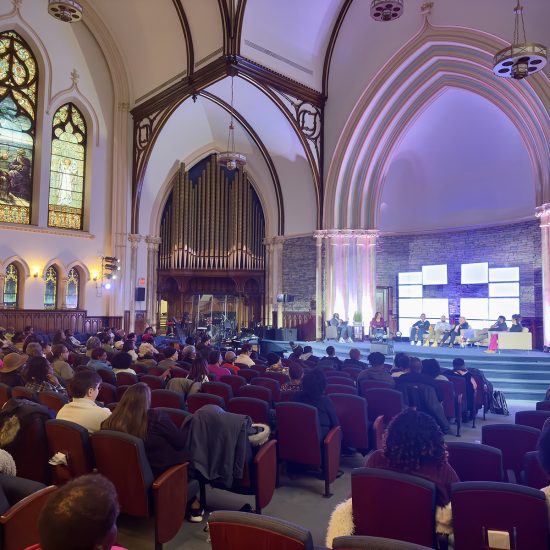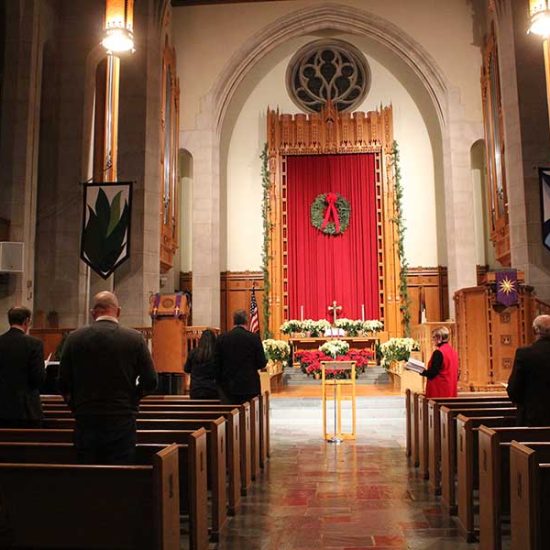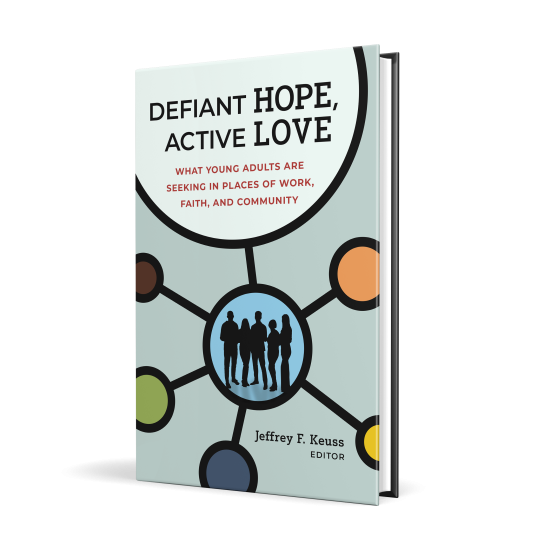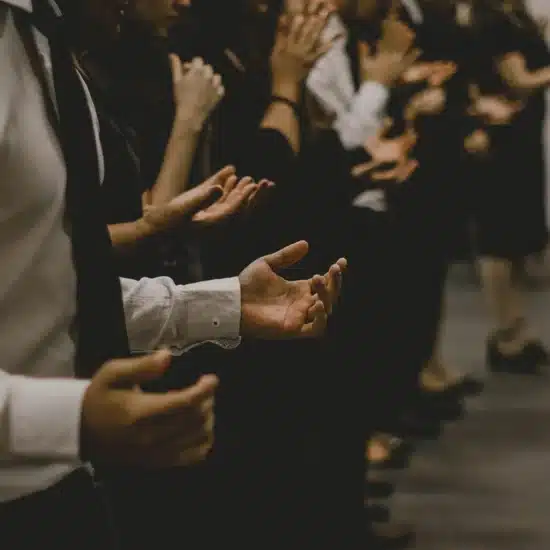
It was a microcosm of all that it means to be a church in one Sunday. We were saying goodbye to our beloved church organist, who was retiring after a decade and a half of service to our community, with a lovely worship service of music. Our bread-baking ministry was taking fresh loaves to the local Ukrainian congregation as a tangible sign of prayerful support. A new faith formation class was launching to bring together different generations in authentic discussions of our faith journeys. The high school students were on a retreat of respite and renewal at the beach. And… we were learning that one of our church staff members – a man with a servant heart like no other – passed away the previous day due to cancer complications.
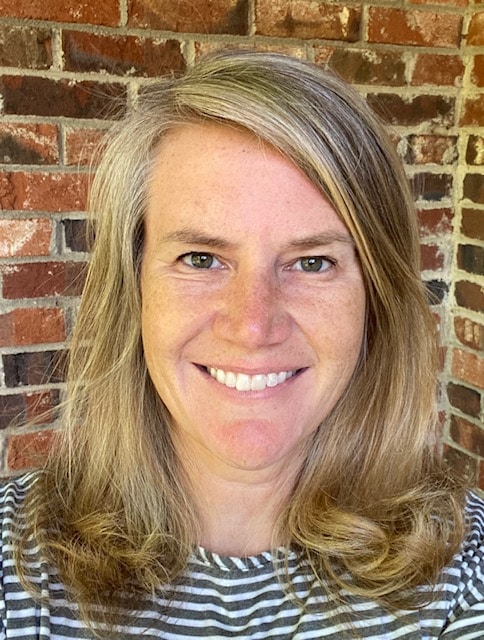
Sarah Blackwell
As I learned the news downstairs, I was wondering how my teenage son upstairs in the youth area was reacting. At this moment, I was so grateful for the love and support of the youth volunteers who invest themselves in the lives of our teenagers. Upstairs, the youth were processing grief with trusted adults that held space for the full range of emotions. On this day where we encountered the spectrum of feelings from anger to gratitude to hopefulness to sadness to deep love, I was so thankful that my children had a church community to experience life with. I was reminded of why our kids need church in ways that extend far beyond Bible stories and learning to be nice.
It is said that drowning is often a silent slipping underwater rather than the screaming and flailing shown in movies. There is no doubt our teens are being overcome by waves of anxiety, loneliness, and self-doubt. Many are silently slipping away. Even before the pandemic, they were faced with rising expectations for coursework and activities in the hopes of getting into the “right” college or finding the “right” job. The pandemic has raised the heat on mental health problems that have been simmering for years. Social media and smartphones prompt our teens to be “on” 24-7 with no breaks from social pressures. So how can the local church help without being just “one more thing” that teens have to keep up with or feel obligated to? What gap can we fill in the lives of our teens that will help them thrive and not just survive? Can we see their silent cries and pull them out of the tumultuous waters? Can we help them find their way back to solid ground?
Over the course of the next week, I was reminded again and again of how the lives of the adults at our church were woven into the lives of my children. Here there were trusted piano teachers, carpool drivers, field trip chaperones, and basketball coaches. Even more important, though, there were adults that just knew their names, remarked on how they had grown, chatted about their favorite sports teams, or asked about summer plans. To have interactions with adults of all ages who require nothing from our kids and to whom our kids feel no need to prove themselves to (like a teacher or coach) is a rare gift. In our congregations, teens can encounter adults that do a variety of jobs, have the same hobbies or interests, hold a wide range of viewpoints, and live in different family structures. They can learn about faith from adults they trust during a time when, frankly, they want to see if their parents have just been feeding them a bunch of bunk or if they are legit. Church is one of the only places they can routinely encounter people of every age from birth to senior adult. Our teens need to be around the giggles of toddlers, the shrieks of rowdy preschoolers, the goofiness of the pre-teens, the coolness of the young adults, the steadiness of other parents (even their corny dad-jokes), and the wisdom of the silver wave. They gain perspective when they realize that life is more than just this season.
More and more our teens are far removed physically from their extended families – people who used to be a refuge from everyday living in previous generations. Where a cool aunt or loving grandfather might have been there as a weekly encouragement in the past, we have got to help teens fill the void. Frankly, the parents need it, too – “church moms” and “church dads” that can be encouragers and supporters when our own parents are far away. As Hebrews 5:24-25 reminds us, “And let us consider how to provoke one another to love and good deeds, not neglecting to meet together, as is the habit of some, but encouraging one another, and all the more as you see the Day approaching” (NRSV). Parents, we have got to find a way to re-engage our teens in intergenerational community after the pandemic. We have to get them there. Congregants, we have got to show up and be waiting with open arms to love them. We all need each other.

Cristian Palmer / Unsplash
One result of the pandemic is that a lot of our young people have lost their ability to dream. They have become practical beyond their years. Their “hope” muscle needs a lot of exercise. It has laid dormant too long as they got burned over and over again as things were taken away from them. Our congregations are great places to start the conversation of hope with them again – after all, we are resurrection people. We can help them identify their emotional intelligence. We can ask them about their dreams. We can encourage them to pursue the pulls of their hearts.
This week my son was given a great gift. He learned from the church community the importance of just showing up – being there for each other even if we did not have the words to say. He heard stories remembering with great fondness ones who had gone before – experiencing the collective memory of a people living life in community. He saw up close how different people grieve. There was not just one way to process hard things. He practiced lending support to others going through a hard time. He felt the abundant love of friends who are family. He witnessed how people handled the real problems of the world. He sat at a funeral surrounded by a tangible cloud of witnesses of God’s faithfulness including lifelong friends, his friends’ parents, Sunday school teachers, youth volunteers, music leaders, former youth group members, deacons, coaches, and ministers – many of whom have known him since he was born. All who would help him out in any way that he asked. All who require nothing of him. All that would listen to anything he wanted to talk about. All that were modeling different ways to live into their Christian calling. All who would talk to him about a favorite shared hobby. All that he could talk to if something heavy and important weighed on his mind. All who would be his cheering fans. All who love him just as he is.
Maybe you are intimidated by teenagers. Please do not let this stop you from reaching out. They really just want what we all do: to be loved unconditionally and affirmed for who we are. Here is one helpful hint from twenty years of experience working with youth. If you can, meet children when they are little and love the attention of all grown-ups. Love them through the awkward middle school years where one sincere compliment can sustain them. Use their name to greet them even when you only get a grunt in reply. They always remember who loved them when they were in middle school, and they will trust and invite those people into their circles as they move into high school and beyond.
People sometimes tell me they do not work with youth because they do not feel comfortable enough in their biblical knowledge to answer their deep questions. You may notice that nowhere in this essay was there a requirement for being a Bible scholar. The job description is simple: love them and show them your life. If you have questions, tell them. If you have had doubts, tell them. If you have things that give you life, tell them. If you have a few pieces of sustaining wisdom, tell them. If you see them drowning, reach out and pull them into the lifeboat with you.
Sarah Blackwell is a contributing writer at Word & Way and a 2020 graduate of the Gardner-Webb School of Divinity. She is a former deacon and volunteers with youth and young adults at Providence Baptist Church in Charlotte, North Carolina. The main things she can do to impress her teen and tween sons is occasionally getting the Heardle in one second and water skiing and ice skating better than them. Follow her writings at proximitytolove.org.


